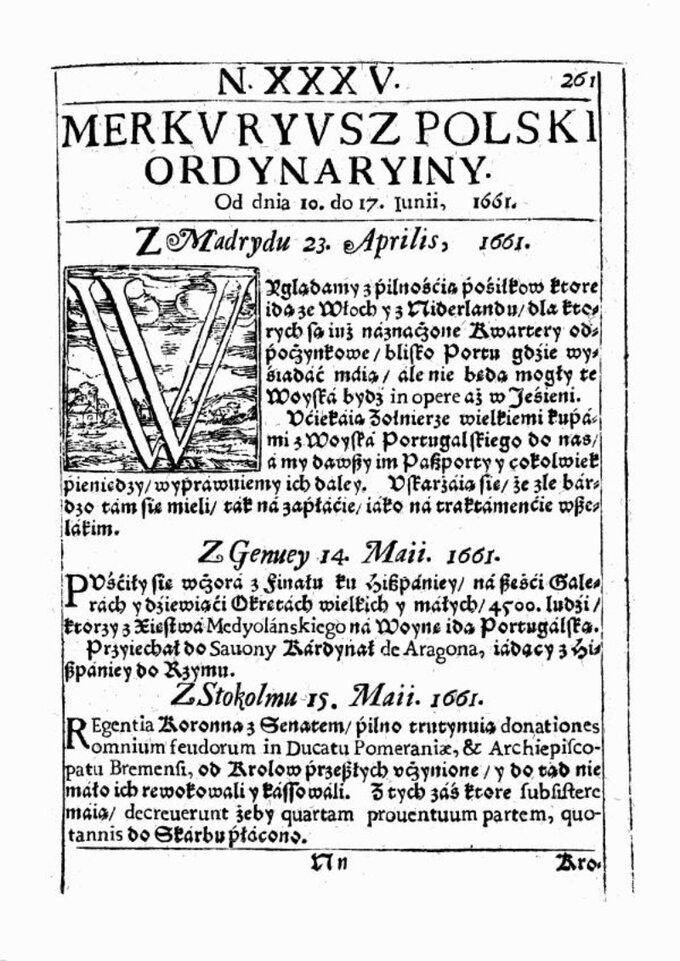“Merkurius Polski Ordynaryjny” is the oldest Polish newspaper. The first issue was published on January 3, 1661. Although the newspaper was published for a short time, it is worth noting its existence as the nucleus of Polish periodicals.
“Merkurius Polski Ordynaryjny”, more precisely: “Merkurius Polski – the history of the whole world reserved for general information” is the oldest Polish newspaper. It was first published on January 3, 1661. Its publication was discontinued on July 15 of the same year after the publication of 41 issues.
The beginning of the Polish press
The origins of the Polish press can be found in calendars and so-called unstable prints. The calendars contained information about the saints, various tips and interesting facts. The booklets included information about court life as well as news about current political events and the situation on the battlefields.
In 1660, the idea of creating a periodical appeared at the court of King John Casimir. The initiator of the creation of the newspaper was the king's wife, Queen Maria Luisa Gonzaga. Thus, on January 3, 1661, the first issue of “Merkurius Polski” newspaper was published. The introductory article of the first issue began with the words: “It is, so to speak, the only food of the human mind, to know and know as much as possible: it is what it feeds on, it delights in. , is satisfied with that.”
“Mercurius” is the first newspaper in the world, the purpose of which was to convince the public opinion of a specific political program – the “contraband” theses of “Mercurius” supported by the royal court under the command of the king. These included, for example, the liberum veto or restrictions on vivente rege coronations, i.e. the coronation of an heir during the reigning monarch's lifetime. Along with Mercurius, a newspaper was published, which disseminated information from Poland abroad, under the title. “Continuazione del Mercurio Polacco”. However, its content was significantly different from the content of “Mercurius”.
The texts of “Mercurius” were edited by Jeronim Pinoch, a Pole of Italian origin, and Jan Alexander Gorczyn (Cracow printing house).

The first issue of the newspaper was called “Merkuriusz Polski”. Only from the second issue was the term “ordinary” added to the name. Some issues were published under the title “Merkurius Polski Extraordynaryjny” if they contained any additional material. The last issue of July 15, 1661 was called “Merkurius Ordynaryjny To Jest Wininy Z Różnych Krają”.
“Mercurius” was published once or twice a week with a circulation of 100-200. It was about 8-12 pages and cost 10 gros. The editorial office of the newspaper was located in Warsaw, and from the 38th issue, it was moved to Krakow. The paper discussed topics such as court life, official affairs, international treaties signed and the situation on the war fronts from across Europe.
The name “Mercurius” comes from the Roman god Mercury, who is considered the patron saint of merchants and couriers. This name has also been given to newspapers in other countries, including: England (“Mercurius Aulicus” or “Mercurius – Britannicus, reporting the affairs of Great Britain: for the better information of the people”).
The first newspaper in the world
The first newspapers in the world were published in 1609. These were “Ralation” from Strasbourg and “Aviso” from Wolfenbüttel. The first daily newspaper was published a little later, in 1650 in Leipzig.
The first newspaper in present-day Poland was the Wöchentliche Zeitung, published in Gdańsk in 1618. The development of periodicals took place only in the middle of the 18th century. “Nowiny Polskie” (domestic news) and “Relata Refero” (foreign news) have been published in Poland since 1792. After a while they were renamed “Kurier Polski” and “Kurier z Dudzych Krajów”. The first newspaper with a circulation of 1 million copies was the French daily “Le Petit Journal” in 1890.
The word “gazette” probably comes from the Italian gazzette, a term for a small coin minted in Venice. The word gazza also means a magpie, a picture of which appeared in Italian newspapers. The magpie represented the transmission of gossip and gossip.
Also read:
Jan Kazimierz Vaza. Was he really such a bad ruler?Also read:
Lviv weddings. Poland was entrusted to the care of the Mother of GodAlso read:
Piekarski is in agony. How was the assassination of King Sigismund III Vasa?Also read:
Test: Polish queens. Do you know the wives of Polish kings?
(translate tags)merkuriusz polski ordynaryjny
